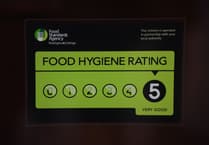This Saturday (July 12) - eight local runners from Pembrokeshire will be running the length of the Eastern Cleddau from its source to the sea in order to draw attention to the polluted state of National Park waterways.
The runners will be embarking upon the journey from the headwater springs in the Preselli Hills of Pembrokeshire Coast National Park, all the way down to the estuary at Pembroke Dock and Milford Haven.
Along the way the group will be testing water quality with the help of The Cleddau Project, a volunteer group of local people campaigning hard to highlight the declining state of the river and turn its fortunes around.
The runners will also be meeting people along the way who have a close connection to the river and first hand experience of the decline in water quality, biodiversity and habitats witnessed as the river flows in and out of the Pembrokeshire Coast National Parks down to the sea.
Commenting, Dr Rose O'Neill, Chief Executive, Campaign for National Parks:“It's shocking that rivers in National Parks like the Cleddau are some of the worst places for water health. The right decisions need to be made to clean them up, and fast.'
“Rivers in National Parks are not considered a priority by water regulators and companies. This ‘designation blindness’ has long played out on rivers, lakes and streams across the National Parks and we’re campaigning for National Park waterways to be prioritised and properly protected.”
A spokesperson for The Cleddau Project said: “For decades our river’s been taking a beating from sewage, farming, industry and more - and now climate change is piling on the pressure- the whole ecosystem’s in trouble and if we don’t step up now the damage could be irreversible. We’ve got to turn things around before it’s too late and we’re delighted that CNP is helping us push for change.”
The Bigger Picture: Pollution in National Parks
Rivers in our National Parks should be some of the cleanest and most protected in the country, but right now, they are in serious trouble. Across England and Wales, rivers like the Cleddau in Pembrokeshire Coast National Park and the River Wye in the Peak District National Park are polluted by sewage, runoff from the land and alarming levels of pharmaceuticals.
Campaign for National Parks are focusing on the River Cleddau as a river at risk because of the high levels of agricultural pollution which ends up getting washed out to sea within a protected SAC (which includes the Daugleddau estuary in PCNP) and affects biodiversity along the river which has seen a decline in life along its length. They are calling for tighter water regulations in National Parks and an improved duty on public bodies such as Water Companies to prioritise actions to stop pollution in National Parks.
West Wales Rivers Trust have previously highlighted that in the Eastern Cleddau 72% of pollution incidents came from agricultural premises between 2016 and 2022. Slurry was the primary pollutant and only 2 waterbodies in the Eastern Cleddau catchment are in good overall health2
The Western Cleddau SAC suffers from some of the highest concentrations of phosphorous of all Welsh SAC rivers.
Water quality has declined in the Pembrokeshire Coast National Park from 48.3% of water bodies achieving at least good status in 2017 to 28% in 2021 and the River Cleddau is just one example of where a concerted effort is needed by partners across the river catchment area to come together and prioritise water in National Parks as a way to enhance the state of water at land, coast and sea.
The campaign page can be found here: https://www.cnp.org.uk/support/campaigns/end-water-pollution/
The full route of the run can be found here: https://explore.osmaps.com/route/26644831/cleddau-trail-run--cnp?lat=51.86841&lon=-4.82763&zoom=9.4894&style=Leisure&type=2d





Comments
This article has no comments yet. Be the first to leave a comment.